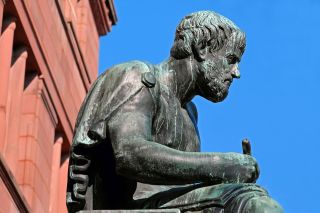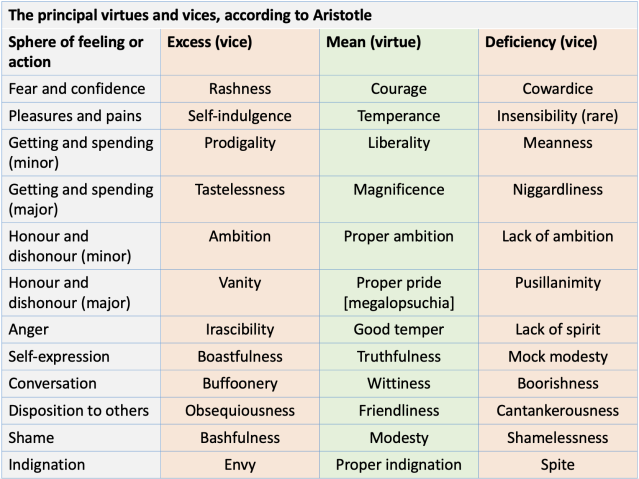Happiness
How to Be Good and Happy, According to Aristotle
Exploring Aristotle's "golden mean."
Posted April 18, 2023 Reviewed by Ekua Hagan
Key points
- According to Aristotle, it is impossible to define virtue with any precision.
- Instead, each virtue resides in the rough mean between its excess and its deficiency.
- Hitting this mark is a form of success and worthy of praise.

In Book Two of the Nicomachean Ethics (c. 330 BCE), Aristotle argues that moral virtues are developed by habit. Unlike sight and hearing, which are given to us at birth, virtue is not in our nature. But neither is it contrary to our nature, which is adapted to receive it. Just as a sculptor became a sculptor by sculpting, so the virtuous became virtuous by exercising virtue.
One cannot define virtue with any precision because the goodness of a feeling or action is highly person- and context-dependent. All that can be said is that virtue, like strength, is undermined by a lack or excess of training. For instance, he who flees from everything becomes a coward, while he who runs headlong into every danger becomes rash. Courage, in contrast, is given by the mean.
Moral excellence is intimately related to pleasure and pain. It is in the pursuit of pleasure and avoidance of pain that bad deeds are committed, and good deeds omitted. Hence, it is by pleasure and pain that bad people are bad.
There are three objects of choice, the noble, the advantageous, and the pleasant, and three objects of avoidance which are their contraries, the base, the injurious, and the painful. The good tends to go right about these, whereas the bad tends to go wrong. This is especially true of pleasure, which is common to the animals, and also contained in the advantageous and the noble. The good feel pleasure from the most beautiful, noble [kalos] actions, but the bad or not-good are often confused about what might be most pleasant. It is harder to fight with pleasure than with anger, but virtue, like art, is concerned with what is harder, and the good is better when it is harder.

A person may perform an apparently virtuous action by chance or under duress. An action is only virtuous if it is recognized as being virtuous and performed for that sake by a person with a set, unvarying character. In short, an action is only virtuous if it is such as a virtuous person would perform.
The Golden Mean
Three things are found in the soul: passions, faculties, and dispositions [hexeis]. As virtues are neither feelings nor faculties, they must be dispositions: dispositions to aim at the intermediate, or mean, between deficiency and excess.
Hitting this mark is a form of success and worthy of praise. While it is possible to fail in many ways, it is possible to succeed in one way only, which is why the one is easy and the other is difficult. By the same token, men may be bad in many ways, but good in one way only.
So far so good, except that not every passion or action admits of a mean: for instance, not envy or murder. It is never a question of murdering the right person, at the right time, in the right way, for murder is neither a deficiency nor an excess, but always and intrinsically vicious.
The principal virtues along with their corresponding vices are listed in the table below.
In some cases, one vice can be closer to the virtue than the contrary vice. For instance, rashness is closer to courage than cowardice, and prodigality is closer to liberality than meanness. This is partly because the contrary vice, whether cowardice or meanness, is more common. Hence, people oppose not rashness but cowardice to courage, and not prodigality but meanness to liberality.

It is no easy task to be good. To increase the likelihood of hitting the mark, we should do three things:
- Avoid the vice that is furthest from the virtue or mean
- Consider our vices and drag ourselves toward their contrary
- Be wary of pleasure and pain
To quote Aristotle:
For in everything it is no easy task to find the middle… anyone can get angry—that is easy—or give or spend money; but to do this to the right person, to the right extent, at the right time, with the right motive, and in the right way, that is not for everyone, nor is it easy; wherefore goodness is both rare and laudable and noble.
Sometimes, we may somewhat miss the mark, for instance, get angry too soon or not enough, yet still be worthy of praise. It is only when we deviate more markedly from the mean that we become blameworthy.
We help others by being virtuous, but we also help ourselves, for virtue is a disposition to happiness, and happiness is the exercise of virtue.
Neel Burton is the author of The Gang of Three: Socrates, Plato, Aristotle.




